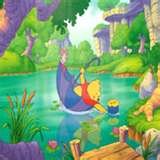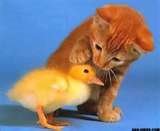
As he tasted the water from the creek bed,
he saw the reflection of a dogs’ head!
He turned his head sideways, unsure what to do,
But when his head turned, the dogs’ head turned too!
Poddle barked at the dog, but his body felt weak.
He tried to run backwards, and slipped in the creek.
(From my manuscipt, Poddles Mistake)
The problems first graders have to deal with on their first day of school, and later, has an enormous influence on how they will deal with life later on. Especially when they are paralyzed by the fear that they will somehow not met their parents, teachers, and peers expectations. Everyone likes to read about what they can relate too, and children are not any different. That’s why people who write for pre-schoolers and beginning readers, use these fears as the foundation for many of their books. Since our readers are just beginning to join their peers in the world, especially at school, they are beginning to deal with the many social standards set by a cultural society difficult to master. Many of the social skills required to make it through the first grade require self-confidence, and a strong self esteem. One of the hardest obstacles first graders face is when parents do not realize that first grade involves some of the same problems adults face when starting a new job. In addition, we forget they are coping with some of the same pressures to succeed, as adults, without the benefit of experience. Now, who among us would like to repeat the first grade?
In many ways, we have all remained in first grade, stuck in the fear of rejection, no matter how confident and successful we happen to be.
Deep down within us all, we remember the fear of stepping off the school bus for the first time, and entering a classroom of other children. It really is a terrifying feeling, your hands are sweating, and your mind is racing, wondering how your clothes and school supplies compare with other students. I remember my teacher assigning desks, and the desk she assigned me, had some unmentionable grossness stuck under the seat. I felt it when I put my hand underneath the desk the second day of school . I was too embarrassed to tell the teacher, so I spent most of my first year of school horrified by what may be lucking from beneath my desk! Why I didn’t tell my mother, I do no know, although, I suspect it was since I thought I would let her down somehow. Children can be so silly, however I think they pick up on the fact that fear makes grown ups uncomfortable. Hence, we deny our children’s fears, and run from most experiences that have the propensity to cause us pain.
We are biologically designed to forget pain, especially when it comes to our children. I think the first way to help children overcome any fear, is to relate their experiences to our own. Think back to your first day of school, and what you would have wanted your Mom to say. Maybe your parents brought you to school, and even brought you into the classroom. However, you probably started your first day the same as the rest of us, keeping your fear of rejection at arms length, not eluding to the fact, you were scared to death. What is wrong with being afraid anyway? Who ever said it was something to be ashamed of? Somewhere, someone came up with the idea that fear is a weakness, and you must hide it away. I remember being embarrassed to cry in front of people at that age, as if there is something wrong with showing your emotion. Somehow, I got the impression, that it is shameful to cry in front of others.
My manuscript, Poddles Mistake, (exerpts above) deals with children’s fear of rejection , and there are plenty other manuscripts and books for children that do. Since it is a characteristic bestowed upon first graders everywhere. We can all relate, and I think we owe it to our children to help them discover the ways in which we can help them cope with these fears. Fear is an antiquity faced over and over again, by us adults everyday, so when we notice it in our children, these characteristics are intimidating. The puppy in my manuscript is so afraid of displeasing his owner, he leaves home, and his owner is never made aware of his feelings. Forced to come to terms with his fear of rejection, he masters it, and in doing so gains confidence in his own ability, to make himself happy. Since, he recognizes his fear for what it is, he is able to overcome it, and is set free by the experience. Conquering fear is one of the biggest challenges with face in life, so it is important we learn to manifest the necessary coping skills, early in our lives.
In the literary world one must agree to conform to the principles of rejection, so I have struggled with this issue, however nothing compares to dealing with that same prospect in the first grade; consequently, children really need their parents on this issue. Kids also fear rejection by their parents and friends, so be careful with what you say. Watch saying things like, “ If they jumped off a bridge, would you do it too?” since children really want to please their peers, and this will make them feel foolish. This is too young an age to understand what that means anyway, and it does not help you, help them, build confidence in their own abilities. Get your kids to talk to you about what they are most afraid of, and then validate their feelings by giving examples of how you dealt with the same desire to fit in with the crowd, and please parents and teachers. Young children learn by watching their parents, so begin by being the living expression of what you wish your children to be, and encourage the fact they can and will become and be anything they wish.
Poddles Mistake is unpublished at the moment , however there are many good books available, to help children overcome fear in school , and in other areas of life.
Poddles Mistake will be available on the market before you know it, so remember the title and subject matter!
Thanks for reading-



















